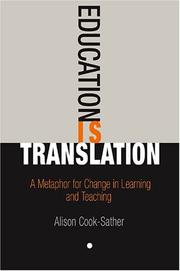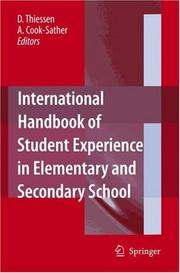| Listing 1 - 6 of 6 |
Sort by
|

ISBN: 0812238893 9780812238891 Year: 2006 Publisher: Philadelphia, PA : University of Pennsylvania Press,
Abstract | Keywords | Export | Availability | Bookmark
 Loading...
Loading...Choose an application
- Reference Manager
- EndNote
- RefWorks (Direct export to RefWorks)

ISBN: 1280938099 9786610938094 1402033672 1402033664 9781402033674 Year: 2007 Publisher: Dordrecht : Springer,
Abstract | Keywords | Export | Availability | Bookmark
 Loading...
Loading...Choose an application
- Reference Manager
- EndNote
- RefWorks (Direct export to RefWorks)
The International Handbook of Student Experience in Elementary and Secondary School is the first handbook of its kind to be published. It brings together in a single volume the groundbreaking work of scholars who have conducted studies of student experiences of school in Afghanistan, Australia, Canada, England, Ghana, Ireland, Pakistan, and the United States. Drawing extensively on students’ interpretations of their experiences in school as expressed in their own words, chapter authors offer insights into how students conceptualize and approach school, how students understand and address the ongoing social opportunities for and challenges in working with other students and teachers, and the multiple ways in which students shape and contribute to school improvement. The individual chapters are framed by an opening chapter, which provides background on, bases of, and trends in research on students’ experiences of school, and a final chapter, which uses the interpretive framework translation provided to explore how researching students’ experiences of school challenges those involved to translate the qualitative research methods they use, the terms they evoke to describe and define students’ experiences of schools, and, in fact, themselves as researchers.
Classroom environment. --- School environment. --- Environment, School --- Educational sociology --- Classroom climate --- Climate, Classroom --- Environment, Classroom --- Classroom management --- School environment --- Teacher-student relationships --- Curriculum planning. --- Early childhood education. --- Learning & Instruction. --- Teaching and Teacher Education. --- Curriculum Studies. --- Educational Policy and Politics. --- Early Childhood Education. --- Education --- Curriculum development --- Instructional systems --- Planning --- Curricula --- Design --- Learning. --- Instruction. --- Teaching. --- Curriculums (Courses of study). --- Education—Curricula. --- Educational policy. --- Education and state. --- Child development. --- Core curriculum --- Courses of study --- Curricula (Courses of study) --- Curriculums (Courses of study) --- Schools --- Study, Courses of --- Didactics --- Instruction --- Pedagogy --- School teaching --- Schoolteaching --- Pedagogical content knowledge --- Training --- Learning process --- Comprehension --- Child study --- Children --- Development, Child --- Developmental biology --- Education policy --- Educational policy --- State and education --- Social policy --- Endowment of research --- Development --- Government policy --- Investigación cualitativa --- Aprendizaje --- Política educativa --- Enseñanza primaria --- Enseñanza secundaria --- Estudiantes --- Educación secundaria --- Enseñanza media --- Escuelas secundarias --- Estudiantes de enseñanza secundaria --- Educación primaria --- Enseñanza elemental --- Educación y Estado --- Estado y educación --- Política de educación escolar --- Derecho a la educación --- Proceso de aprendizaje --- Comprensión --- Educación --- Autoaprendizaje --- Análisis cualitativo (Investigación) --- Métodos cualitativos (Investigación) --- Investigación científica
Digital
ISBN: 9781402033674 Year: 2007 Publisher: Dordrecht springer
Abstract | Keywords | Export | Availability | Bookmark
 Loading...
Loading...Choose an application
- Reference Manager
- EndNote
- RefWorks (Direct export to RefWorks)
Teacher education. Teacher's profession --- Curriculum development --- School management --- Didactics --- Educational sciences --- onderwijspolitiek --- didactiek --- opvoeding --- curriculumontwikkeling --- lerarenopleiding
Book
ISBN: 9781118836064 9781118836262 9781118434581 Year: 2014 Publisher: San Francisco : Jossey-Bass
Abstract | Keywords | Export | Availability | Bookmark
 Loading...
Loading...Choose an application
- Reference Manager
- EndNote
- RefWorks (Direct export to RefWorks)
"The book is designed to offer both a theoretical grounding and practical guidelines and advice--from faculty, students, and coordinators/directors of teaching and learning centers--on how to develop student-faculty partnerships focused on affirming and improving teaching and learning in higher education. This is a why-to and a how-to book, and it provides those interested in trying out their own version of student-faculty partnerships with theory and evidence that supports such efforts, various models of how to go about creating and supporting such partnerships, and advice from a wide-range of experts, on the one hand, and faculty and students who have tried this approach, on the other hand. That balance--of theory, step-by-step guidelines, expert advice, and practitioner experience - will provide those interested with a wide range of perspectives and possibilities on how to build student-faculty partnerships and various levels of guidance. The book will include helpful responses to a range of questions that we have been asked by academic staff from different institutions, disciplines, and levels of experience. These responses will attempt to help faculty overcome some of the perceived barriers to student-faculty partnerships and suggest a range of possible levels of partnership that might be appropriate in different circumstances"
College teaching --- Teacher-student relationships --- Learning, Psychology of
Book
ISBN: 9781951414009 1951414004 Year: 2019 Publisher: Elon, North Carolina Elon University Center for Engaged Learning
Abstract | Keywords | Export | Availability | Bookmark
 Loading...
Loading...Choose an application
- Reference Manager
- EndNote
- RefWorks (Direct export to RefWorks)
"Pedagogical Partnerships and its accompanying resources provide students, step-by-step guidance to support the conceptualization, development, classroom and curriculum. This definitive guide is written for faculty, students, and academic developers who are looking to use pedagogical partnerships to increase engaged learning, create more equitable and inclusive educational experiences, and reframe the traditionally hierarchical structure of teacher-student relationships. Filled with practical advice, Pedagogical Partnerships provides extensive materials so that readers don't have to reinvent the wheel, but rather can adapt time-tested strategies and techniques to their own unique contexts and goals"--Publisher's website.
Book
ISBN: 9783832587116 9783832550899 Year: 2020 Publisher: Berlin Logos Verlag
Abstract | Keywords | Export | Availability | Bookmark
 Loading...
Loading...Choose an application
- Reference Manager
- EndNote
- RefWorks (Direct export to RefWorks)
Student Empowerment in Higher Education'brings together the accumulated knowledge and experience of many accomplished teachers and students from higher education institutions around the world, and has much to offer those who are engaged in higher education, as students, teachers or support staff. The authors offer personal reflections in teaching, learning, mentoring, assessment, hands-on activities, course design and student identities in higher education across the globe, supported by academic research and scholarship. Readers are provided with a window into tried and tested empowering practices in varying contexts, enabling them to see what works and what does not, alongside the challenges and possibilities. A distinctive feature of this book, and its paramount strength, is that it explores best practices in student empowerment, whilst reflecting on matters of teaching and learning that are familiar to students and teachers alike, and also explores practices in a variety of disciplines. The intention of these volumes, therefore, is not only to inform readers about the diverse learning and teaching approaches of the authors, but, most importantly, to facilitate processes of student empowerment and promote reflection on teaching and learning practices.
| Listing 1 - 6 of 6 |
Sort by
|

 Search
Search Feedback
Feedback About UniCat
About UniCat  Help
Help News
News